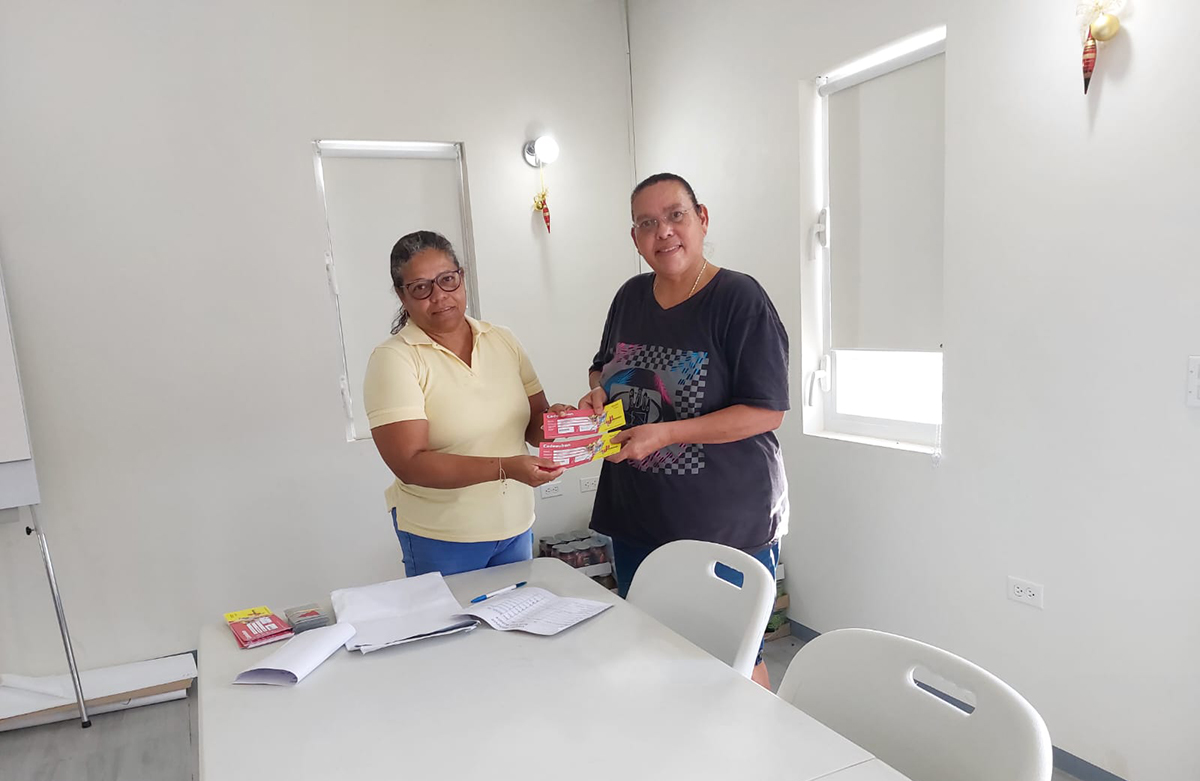Reading time 5 minutes
HUGE GROWTH IN VULNERABLE HOUSEHOLDS DUE TO CORONA CRISIS
Aid for poverty in Bonaire
This time, for 'Around the World', we travel to Bonaire, the island of just over 20,000 inhabitants in the Caribbean part of our Kingdom. Here, the Red Cross launched the Social Economic Plan, designed to provide vulnerable households with assistance. In addition, the Red Cross helps the population to be better prepared for disasters.

The Branch manager of Bonaire with coupons that are handed out in the SEP program
Marciano Silberie, coordinator of the island's Social Economic Plan (SEP), explains the impact of the aid. "Poverty is a big problem on Bonaire. Many people are in debt, for example because of a high energy bill or an expensive doctor's treatment."
Red Cross relief efforts include shopping cards, (school) meals, medical care and home repairs. The Caribbean region is a high-risk area for hurricanes and earthquakes. To be well prepared, volunteers are regularly trained to provide emergency aid and first aid in such cases. There are also disaster preparedness training sessions and help for residents in making a personal emergency plan. "Some live in houses where there is no water or electricity, or whose roof is badly damaged. We then have large water tanks or solar panels installed, for example, because water and electricity are important basic needs."
Signals
"The SEP is meant for people who need the help the most," Marciano continues. "It is not easy to assess that properly. Many people on Bonaire don't ask for help themselves, because they don't want to let others know they are struggling. Those signals do come to us in other ways, for example through school. Then we hear from teachers that some children are eating far too little, and a child who is hungry is not able to learn properly."
“We have to gain their trust first, before they accept our help”
Last year, the Red Cross in the Caribbean helped 1,941 people with e-vouchers for food. In addition to focusing on the now, the assistance also focused on the future. For instance, 447 people were helped to pay school fees. The resources that make the SEP possible come from donors and support from funds from the Netherlands.
"The Red Cross looks at what is the most appropriate help for each situation. To properly assess how we can do something for them, we often visit people's homes. For example, if we find out that they are unable to make ends meet, or are struggling in some other way, we try to help. Especially the first step is a challenge, because we have to approach it very carefully. We first have to gain their trust before they accept our help."
Impact
"The impact of the SEP on Bonaire is huge because there is a lot of poverty here. The percentage of households struggling has increased enormously during the corona crisis. As a result, the demand for social and financial support is currently very high. The people we are able to help are incredibly grateful, because they have often been living for years with major problems they cannot solve themselves."
Due to the dire economic situation, poverty was already high in the Caribbean part of the Kingdom. Due to the collapse of tourism during the pandemic, the number of vulnerable households rose rapidly. "We are also working together with Caritas, an organisation dedicated to helping undocumented people on the island. A large proportion of these people cannot work because they do not have the right papers. If they receive a big bill, for example because of a doctor's treatment or medication, they get into a financial mess. Then we try to assist them."
Future
The SEP started as a temporary project that would last for one year. "After that, we evaluated the project, taking a close look at the real impact the emergency aid had. We then saw that the demand for aid was too great to stop the project. Within the Red Cross, we are now investigating the possibilities of allowing the project to continue for longer, because there are still many people who really cannot do without help."